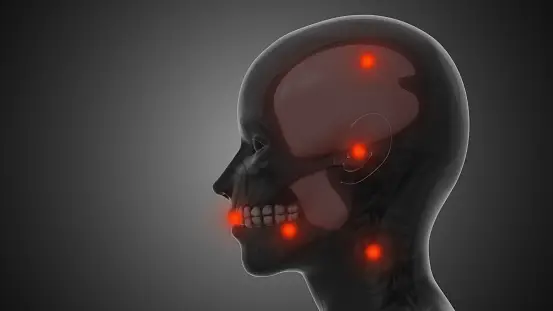
22 Mar Can My Dentist Help With TMJ?
How Dentists Can Help With TMJ

TMJ, or temporomandibular joint disorder, is a condition that affects the jaw joint and surrounding muscles, causing pain, discomfort, and limited jaw movement. It can significantly impact a person’s quality of life, making it difficult to eat, speak, and even sleep.
If you’re struggling with these symptoms, you’re probably wondering, can my dentist help with TMJ? Yes, your dentist can help with TMJ. Dentists are extensively trained in the anatomy and function of the jaw joint and the surrounding structures and can provide several different treatment options.
Since TMJ is commonly associated with dentistry, it is important to understand the role that dentists can play in its diagnosis and treatment.
What Your Dentist Can Do to Help Your TMJ

Dentists can accurately diagnose TMJ through a comprehensive evaluation, which may include a physical examination, reviewing your medical history, and taking X-rays or other imaging tests. Identifying the underlying causes and specific factors contributing to TMJ is crucial for developing an effective treatment plan.
One common cause of TMJ is teeth misalignment or malocclusion. Dentists can assess your bite and identify any dental issues that may be contributing to your TMJ symptoms. They can provide treatment options such as orthodontic correction or the use of dental appliances like splints or mouthguards to help realign the jaw and alleviate pressure on the joint.
Another potential cause of TMJ is teeth grinding or bruxism, which often occurs during sleep. Dentists can detect signs of teeth grinding by examining your teeth for wear, fractures, or other damage. They can fabricate a custom-made nightguard that acts as a protective barrier between your upper and lower teeth, preventing further damage and reducing muscle tension associated with TMJ.
In some cases, TMJ may be caused by muscle tension and stress. Dentists can recommend stress management techniques or refer you to other healthcare professionals who specialize in treating chronic pain and stress-related disorders. They may also provide muscle relaxants or pain medications to help manage acute symptoms.
Furthermore, dentists can offer guidance on self-care techniques that can provide relief for TMJ symptoms. This may include jaw exercises, applying heat or cold packs to the affected area, practicing relaxation techniques, and avoiding hard or chewy foods that can aggravate the condition.
It is important to note that in complex cases of TMJ, dentists may work in collaboration with other healthcare providers such as oral and maxillofacial surgeons, physical therapists, or pain management specialists to ensure comprehensive care.
In conclusion, dentists can certainly play a significant role in helping with TMJ. They possess the expertise to diagnose the condition, identify underlying causes, and provide appropriate treatment options. Seeking early intervention from a dentist can lead to effective management of TMJ symptoms and improve your overall oral health and well-being.
How to Prevent TMJ

Preventing TMJ, or temporomandibular joint disorder, involves adopting healthy habits and minimizing stress on the jaw joint. Here are some tips to help prevent TMJ:
- Practice good posture: Maintain proper posture throughout the day, especially when sitting or using electronic devices, to avoid straining the jaw.
- Avoid excessive jaw movements: Limit activities that strain the jaw joint, such as excessive gum chewing or biting hard objects like pencils or fingernails.
- Manage stress: Find stress-relief techniques like meditation, deep breathing exercises, or engaging in activities you enjoy to reduce jaw clenching and tension.
- Avoid teeth grinding: If you grind your teeth during sleep, consider using a custom-fitted mouthguard to protect your teeth and alleviate jaw pressure.
- Maintain a balanced diet: Eat a well-balanced diet that includes soft, non-chewy foods to reduce stress on the jaw joint and minimize the risk of TMJ.
- Practice jaw relaxation exercises: Regularly perform gentle jaw stretches and relaxation exercises to relieve tension and promote jaw joint flexibility.
By adopting these preventive measures, you can reduce the risk of developing TMJ and promote overall jaw health. If you have concerns about TMJ or experience persistent jaw pain or discomfort, consult with a healthcare professional for guidance and personalized recommendations.
Related Questions
Is TMJ curable? TMJ is a complex condition, and its curability depends on various factors. In many cases, TMJ symptoms can be alleviated through a combination of treatments such as lifestyle changes, dental interventions, physical therapy, and stress management techniques. However, a complete cure for TMJ may not always be possible, especially in severe or chronic cases.
Does TMJ require surgery? In most cases, TMJ does not require surgery. The majority of individuals with TMJ find relief through non-surgical treatments such as lifestyle modifications, physical therapy, dental interventions, and pain management techniques. However, in rare cases where conservative treatments fail to provide relief or when there are structural abnormalities or severe joint damage, surgical intervention may be considered.


Sorry, the comment form is closed at this time.